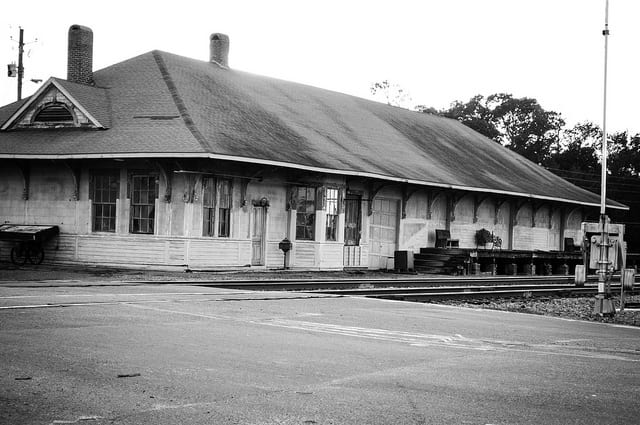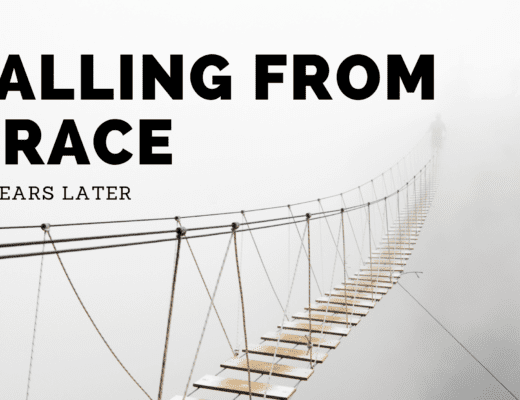
There are a couple things everyone assumes about the people they meet here in the town of Eastman, Georgia; you probably vote Republican, and you probably self identify as a Christian; whether or not there is any evidence of that identification in your life. Eastman is your typical small town in the deep South, complete with a history of dirty politics – a long one, a ratio of people to churches that makes Vatican City look secular, and a general fear of progressive values which keeps our economy lagging behind larger cities (Like Blue laws which prevent bars and fine dining establishments from opening).
These things aside, I actually like my town – it’s generally quiet and I feel safe here. I like most of the people here and I have a growing business that I’m proud of with a client base ranging from the most affluent individuals and businesses to those individuals you would consider the most in need. I’m well known, both as a business owner and as an outspoken atheist activist that stands up for what he believes in – and despite the latter, I gather that I’m actually fairly well liked. Most of the people here are nice, and even in the things we disagree about they are well meaning in their endeavors and beliefs and most people here aren’t your stereotypical mouth breathing “rednecks” who can’t put together a coherent sentence to save their life. We have incredible teachers in our schools who are dedicated and who break their necks to educate with the resources they have who I believe lend to the “Yankee’s” surprise when they hear us use complex language and ideas.
Regardless of what I believe I’ve always found myself at odds, in some ways, with my community. Some of my rebellious nature has waned as I’ve aged and matured, but I’ve always felt a need to stand as a representative for some form of social justice and of rightness in the ways that I can – even if those ways were misguided in the past, I’ve never been afraid to say unpopular things in sometimes unpopular ways, though I believe I’ve progressed in the way I present myself over the years and honed my approach toward my community, which has helped me build more good relationships than bad ones.
The question still remains – why, would I ever become such an outspoken atheist activist in the Deep South knowing full well that it might prevent me from ever finding another job, expanding my business, or becoming any more than a social pariah? Why would I take such a risk.
Defeating The “Get the Hell outta Dodge” Mindset
For generations young people in my community and communities like mine who think differently from the status quo have dreamed of the day when they would be free to “get the hell out of Dodge” to chase their dreams and speak freely about their beliefs, opinions, or sexuality. Years of being the black sheep, the oddball, the queer kid, the liberal, or the atheist can make someone giddy over the idea of just leaving and never coming back – and many do just that. Who can blame them?
It’s hard to stick around when you feel like your community doesn’t really belong to you – like you don’t belong to it and I think, in a big way, this is one of the major reasons why these old Southern communities stay the way they are: all the people with the ideas and desires to see them move forward move to larger and more progressive cities the moment they have a chance.
This diaspora of brilliance, progressivism, and compassion leads to a vacuum of reason and forward thinking in small towns like ours. It leaves the status quo intact to continue it’s stranglehold on our community with the same antiquated thought that has brought us to where we are.
People who think differently and make it known in small Southern towns are popular targets for evangelistic efforts, and when those efforts don’t work they are social outcasts – because society and status here has more to do with what church you belong to than the content of your character. People want to escape that. I don’t blame them, I probably would have at a certain point in my life – but circumstances arose in my life that kept me here and I’m ultimately glad to still be here moving the conversation in the direction I want it to go.
If we all leave, if we don’t affect the conversation in our communities then the places we grew up will never be places that kids like us will feel comfortable growing up. We have a responsibility to those coming after us that those that came before us never fulfilled.
The Deep South Needs Me to Be Who I Am
And it needs you to do the same.
If I sound arrogant please forgive me, that’s not what’s happening here. What’s happening is communities like mine and thousands of other rural communities in the Bible Belt contain within it individual specimens of brilliance, uniqueness, and humanity who are simply too afraid to let those unique characteristics shine through. Sometimes people simply need an example of that in their own lives to feel comfortable enough to shake away their own fears and insecurities.
Closets are full in communities like mine and people shouldn’t feel like they have to be in them – with enough proud public faces willing to step out and live with the consequences of whatever previously unacknowledged or pulpit-shamed taboo it is they are willing to present it becomes easier and easier for others to do the same. These newly free people are then able to build communities of support, further lessening the blow of the theocracy that surrounds them. This is why I’ve asked people to embrace their labels in the past, and use them as words of great pride.
Some People are Teachable (even me)
Activism, for the atheist, generally entails entering into conversations that aren’t generally considered “polite conversation”. It means challenging peoples most deeply held beliefs, offending people’s sensibilities at times, and disagreeing with some people who are vehemently defensive of their right to be wrong. Talking to people about the things I talk to them about requires a certain finesse and can often be an intimate affair; as people often confess the depth of their doubts, their fears about religion and family, and how unsure they really are about everything they have to pretend to be so confident in. I always approach people with an absolute openness – there’s no question I won’t answer, no topic I won’t cover, and no story about my life I won’t dive into with someone who’s willing to do the same with me.
Most people, after sitting down over lunch or coffee, are willing to learn something about me and how I got to be the person I am today – and I’m genuinely interested in how the people I sit across from get to the point they are at. I find that very few people aren’t in some way teachable – I find that even fewer people don’t have something they can teach me. Those learning and teaching relationships are worthwhile and they teach us a humanitarian compassion that I don’t think any other activity can.
If a Southern Baptist pastor and a godless heathen like me can sit across from one another, whether or not voices are raised at times, and find common ground in our humanity and love for our community then we are both winning and both learning. I’m really proud of the relationships I have with my clergy friends.
Conclusion
Atheist Activism is, for me, Humanist activism. It’s LGBT activism, secularist activism, and it’s also standing up for the values I want to see in my community in the future. It means sticking my neck out when other people might be afraid to do so, so that they might eventually live without that fear. It’s saying unpopular things sometimes just for the sake of exposing people to unpopular ideas for the first time in their lives. It’s learning to live with people who aren’t like you and teaching other’s to do the same. Atheist activism is being an example of humanity that you can be proud of and that others can look up to – and while I’m far from the person I eventually want to become I hope that my continued growth inspires others to continue to work on themselves. I’m old enough and independent enough that I can take these risks, if you are as well I encourage you to find ways to engage in your communities – away from social media (where it’s easy to sit behind a keyboard and throw poo) and remind those in it that behind the label of atheist, queer, liberal, or what have you – is a human being who arrived at their conclusions with much thought, effort, and care.
Why am I an Atheist Activist in the Deep South?
Because someone must be.
